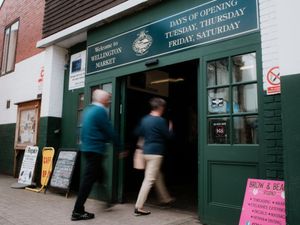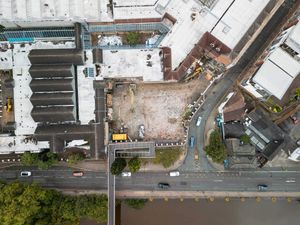£9.5 million contact awarded over new RAF Shawbury training centre
A £9.5 million contract has been awarded as part of a plan to build a state-of-the-art training centre at RAF Shawbury.
Briggs and Forrester Engineering Services Ltd has been handed the contract to provide mechanical, electrical and public health systems on the project.
It will work with Kier Construction on a mixture of refurbishment and new buildings which will host squadron and training functions.
The new training facility at the base will include a training school and a refurbishment of hangars on the site.
It will also be home to cutting-edge new flight simulators to help boost the training of recruits.
It comes after a new £1.1 billion contract was awarded in May to supply rotary wing training – effectively helicopter training – to the Armed Forces until the early 2030s.
"This is fantastic news for the future of our military aircrew at RAF Shawbury, who will benefit from the very latest training methods," said Squadron Leader Kim Leach from Shawbury.
"In addition, older helicopters will be replaced with new, modern platforms that more accurately represent the aircraft used by front line operational squadrons.
"The delivery of the UK Military Flying Training System will ensure that the UK continues to be a world leader in military flying training."
The development forms part of the MoD's 15 year modernisation plan for its flying training programme and facilities.
The United Kingdom Military Flying Training System will involve the replacement of aircraft and the provision of new infrastructure at two military airfields in the UK, including RAF Shawbury and Middle Wallop in Hampshire.
The contract included the delivery of Airbus H135 and H145 training aircraft, and new facilities at RAF Shawbury to train future aircrew to use aircraft such as Apache, Chinook, Merlin and Wildcat.
Another contract was awarded in February for fixed-wing or aeroplane training, taking the total value of the UKMFTS contracts to £2.8 billion.
Ascent Flight Training, which was awarded the latest billion-pound contract, is a tie-up between engineering giant Babcock and American aerospace colossus Lockheed Martin.
RAF Shawbury is well-known as the home of helicopter training for the UK's defence forces.
Decorated alumni include Prince William, who honed his flying skills at the north Shropshire helicopter school before becoming an RAF search and rescue pilot, while UK astronaut Major Tim Peake, who probably did not imagine exactly where his helicopter flight training would take him after graduating from the base in 1998.
Future recruits at the base could find themselves going even further, though.
New facilities, refurbished hangars, and cutting-edge new technology is being installed that is set to give pilots learning their trade in the RAF a serious competitive advantage when they take to the skies in the future.
The £1.1 billion contract to provide rotary wing training to the Armed Forces – taking the value of contracts to provide four core elements of future military flying training to £2.8 billion – was signed in May.
Contracts signed with private sector suppliers for public services reguilarly demand investment in services – a major stipulation for rail franchises is often the promise of upgrades to facilities – and RAF Shawbury is now seeing that bear fruit.
New infrastructure and ground-based equipment at RAF Shawbury in Shropshire to train future aircrew to use aircraft such as Apache, Chinook, Merlin and Wildcat, while Airbus H135 and H145 training aircraft will also be supplied.
At the time the contract was signed with supplier Ascent Flight Training – a joint venture between Babcock and Lockheed Martin – Air Marshal Sean Reynolds, the senior responsible owner for UKMFTS, said the deal would ultimately save money for the MoD.
"The modern aircraft, ground based training equipment and infrastructure procured to sustain the training out to 2033, along with a new training system design will optimise the students time in training and skill sets attained," he said.
"This will in turn ensure that they can be available to conduct operations in defence of the UK and her international interests earlier than ever before and in doing so will provide an overall saving to defence."




